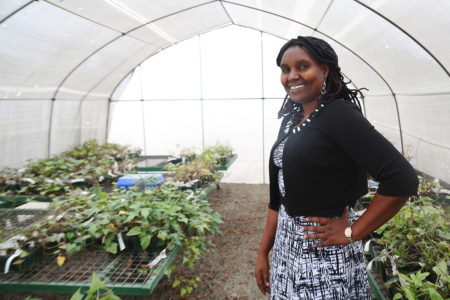
Dorcus Gemenet knows about hunger. As a smallholder farmer’s daughter growing up in Western Kenya, she lived the impact of cyclical drought first hand. Withered maize stalks meant more than an empty belly. They meant being pulled from school to care for her three younger siblings while her mother searched for food. They meant walking farther and farther distances to find feed for her family’s cattle. They meant going to bed hungry too weak to study, too tired to play.
Outside their home, they had a small garden. As a young girl, Gemenet would plant sweetpotato, placing the vines in compact mounds alongside her mother. “It was like a savior crop,” says Gemenet. “It grew when the maize couldn’t. Thanks to sweetpotato, I knew that when I came home, we’d have something to eat.”
That first year, Gemenet’s sweetpotato outperformed her mother’s. “Your hands are good,” her mother told her when she saw her knack for making sweetpotato grow. The following year she gave her all the vines to plant. Once again the savior crop meant food to eat when the other crops failed.
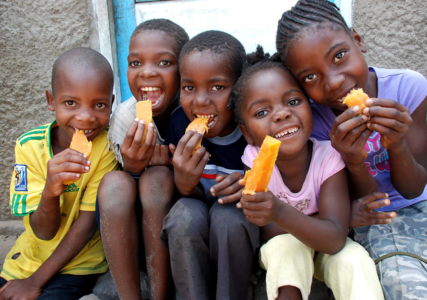
Keeping up with the pace of climate change
“That little girl planting sweetpotato was a very strong person to survive all that she has seen,” says Gemenet of her childhood self. “I think of her as I work. I do not want other children to ever go to bed hungry. I’m working for a world that gives children a chance at a normal childhood.”
For Gemenet, who now has a Ph.D. in applied genetics, that means using her expertise to develop molecular tools that help the International Potato Center (CIP for its acronym in Spanish) accelerate selection for improved sweetpotato varieties. As the impact of climate change intensifies, breeders often find themselves running to keep up.
“The environment is changing much faster than we can currently introduce new adapted varieties,” says Gemenet. “If we can reduce the breeding time for new varieties we can keep pace with climate change and cushion farmers from its impact.”
In recent years, using simultaneous field trials in multiple locations to gauge sweetpotato performance in different environments, speed breeding has halved the time it takes to release improved varieties from about eight years to about four. . Gemenet and her team aim to accelerate the process even further.
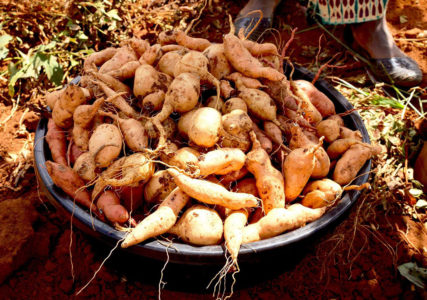
Making improved sweetpotato varieties available to farmers faster
Gemenet is part of a team of scientists working in six different countries to sequence the simpler genomes of two sweetpotato wild relatives ‘Ipomoea trifida’ and ‘Ipomoea triloba’. The goal is to use these to understand where on the complex sweetpotato genome the genes responsible for traits of interest are located. The genomes are publicly available through a genome browser housed at Michigan State University, to be used by breeders globally.
“We can look for genes with desired traits, such as beta-carotene or productivity, and develop DNA markers associated with those genes,” says Gemenet who uses her firsthand understanding of growing up poor to envision a sweetpotato that will meet the needs of smallholder farmers. “We’re looking at the markers for calories and nutrition. We’re looking for tolerance to pests and disease. We’re looking to increase yields so that farmers have food and extra income.”
The sequenced genomes mean that instead of growing plants in the field for four to five months to identify which ones have desired traits, at only two weeks DNA can be extracted from young plants and used to select the plants with required characteristics. The development of each new sweetpotato variety requires several rounds of testing. With four months shaved off during each trial, CIP aims to make new improved varieties available to farmers at a much faster pace.
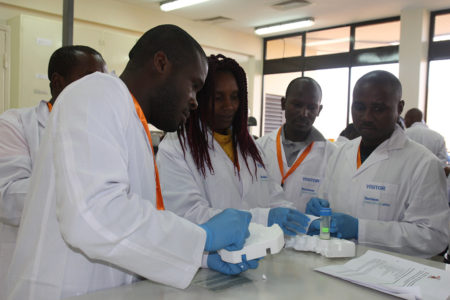
Saving time and money with genetic sequencing
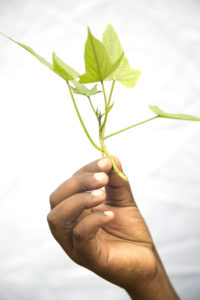
DNA markers not only reduce time, they also reduce the resources spent. It’s expensive to breed in large quantities and test simultaneously in several environments just to discard thousands of plants with unwanted traits.
“With these new tools if you have 6,000 plants in the form of seeds you can test their DNA and identify which ones have the desired traits,” says Gemenet. “Perhaps you only have 400 that are good, those go to the field, and you save on the cost of having to plant and care for the other 5,600 plants.”
“The reference genome and DNA markers are not the only things we are working on,” she says. “We are also developing databases where breeders can openly share data, as well as developing software for analyzing these complex data sets. We also build capacity in breeders to use these tools for marker-assisted breeding when ready.”
At the heart of the innovations are farmers like Gemenet’s parents. “I’m proud of the work I do,” she says. “At CIP we aren’t just looking to get people to eat sweetpotato. We’re helping to create jobs with value chains. We’re making more nutritious varieties to fight malnutrition. Sweetpotato can be used to feed livestock. All of that means boys and girls remain in school.”
Coming full circle
“Even as a little girl ‘my hands were good,’ as my mother would say for growing sweetpotato,” says Gemenet. Now those same hands are working to improve the very “savior crop” that sustained her as a child so that countless children have something to eat in times of scarcity.
“I’m just excited,” Gemenet says. “Although we cannot solve all the problems faced by smallholder farmers, we are doing our best to contribute to the betterment of their lives.
And I am very grateful to our development partners who are walking hand in hand with us to ensure success in this noble mission.”
Dr. Dorcus Gemenet received her Ph.D. in applied genetics from Hohenheim University in Germany. She’s based out of Lima, Peru
